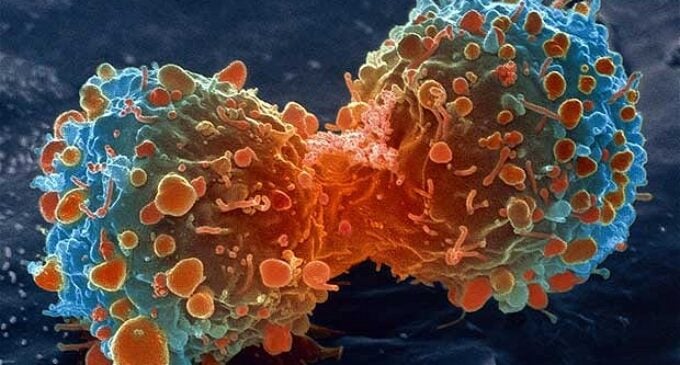Health
NAFDAC approves HPV vaccine for single dose use in routine immunisation

The National Agency for Food and Drug Administration and Control (NAFDAC) has approved Gardasil vaccine, a human papillomavirus (HPV) vaccine, for single dose use in the routine immunisation schedule.
HPV vaccines are vaccines that prevent infection by certain types of human papillomavirus, a common sexually transmitted infection that can cause a range of conditions in men and women, such as cervical cancer.
Gardasil is recommended for girls and boys aged 11 to 12, but it can be given as early as nine years or as late as 26 years.
The vaccine is given as two or three doses, depending on the age of the person receiving it.
In a statement, NAFDAC said it granted Gardasil vaccine regulatory approval as a single-dose schedule based on the scientific evidence that shows that a single dose of the vaccine can provide solid protection against cervical cancer.
“Gardasil has been granted registration approval by the National Agency for Food and Drug Administration and Control (NAFDAC) in exercising its mandate as stipulated by its enabling law, NAFDAC Act CapN1, LFN 2004 and after rigorous regulatory evaluation process for vaccines,” the statement reads.
“Data from immunogenicity trials, post-hoc analyses of efficacy trials, and post-licensure observational studies among females have demonstrated that a single dose of HPV vaccine is sufficient to elicit an immune response that provides similar protection as a multidose regimen against initial and persistent HPV infection.
“The National Primary Health Care Development Agency (NPHCDA) will commence the introduction of the off-label use of quadrivalent Gardasil vaccine as a single dose schedule into the routine immunization in Nigeria in the last quarter of 2023.”
SIX MILLION TO RECEIVE HPV VACCINE FROM OCTOBER 24
Speaking at a press briefing, Faisal Shuaib, executive director of the National Primary Health Care Department Agency (NPHCDA), said the agency has secured six million doses of the vaccine.
He said vaccination of young girls between the ages of nine and 14 years with a single dose of the Gardasil vaccine would commence on October 24.
“This vital vaccine introduction will occur in two phases. The first phase will encompass 16 states, including Abia, Adamawa, Akwa Ibom, Anambra, Bauchi, Bayelsa, Benue, Enugu, Jigawa, Kano, Lagos, Nasarawa, Ogun, Osun, Taraba, and the Federal Capital Territory Abuja,” he said.
“The second phase is scheduled for the first quarter of 2024 and will encompass the remaining states: Borno, Cross River, Delta, Ebonyi, Edo, Ekiti, Gombe, Imo, Kaduna, Katsina, Kebbi, Kogi, Kwara, Niger, Ondo, Oyo, Plateau, Rivers, Sokoto, Yobe, and Zamfara.
“Subsequently, we will continue routine vaccination within health facilities for the same age group. By 2025, we anticipate transitioning to full routine immunisation with the HPV vaccine, focusing on girls aged nine.”
Health
Scientists discover blood proteins that could warn of cancer years before diagnosis

Scientists in the UK say they have found proteins in the blood that could warn people of cancer more than seven years before it is diagnosed.
In two studies funded by Cancer Research UK, scientists identified 618 proteins linked to 19 types of cancer, including colon, lung, non-Hodgkin lymphoma and liver.
The proteins included 107 associated with cancers diagnosed more than seven years after the patient’s blood sample was collected, and 182 that were associated with a cancer diagnosis within three years.
In the first study, scientists studied blood samples from more than 44,000 people in the UK Biobank, including over 4,900 people who subsequently had a cancer diagnosis.
They found the proteins by comparing those present in people who did go on to be diagnosed with cancer and those who did not.
In the second study, the scientists looked at genetic data from over 300,000 cancer cases to find which blood proteins were involved in cancer development and could be targeted by new treatments.
The scientists found 40 proteins in the blood that influenced someone’s risk of getting nine different types of cancer.
The scientists concluded that some of these proteins could be used to detect cancer much earlier and potentially provide new treatment options.
‘FURTHER RESEARCH REQUIRED’
They however cautioned that further research is needed.
Ruth Travis, senior author of both studies, said to be able to prevent cancer, there needs to be an understanding of the factors driving the earliest stages of its development.
“These studies are important because they provide many new clues about the causes and biology of multiple cancers, including insights into what’s happening years before a cancer is diagnosed,” she said.
“We now have technology that can look at thousands of proteins across thousands of cancer cases, identifying which proteins have a role in the development of specific cancers, and which might have effects that are common to multiple cancer types.”
Health
Scientists say a spoon of olive ‘anointing’ oil a day can save your life

In many Nigerian churches, olive oil is used as a spiritual means of healing; it’s called anointing oil. It does have healing properties, though it’s not necessarily spiritual.
The benefits of a spoon of olive oil
The Mediterranean diet—a diet rich in olive oil—causes better brain health and lowers heart disease risk. You can replace vegetable oil with olive oil for a healthier life.
Researchers found that replacing margarine or mayonnaise with olive oil daily reduces the risk of dementia death by 8–14%, but this benefit was not observed when using other vegetable oils or butter.
A scientific study with over 92,000 participants showed that a spoonful of olive oil might be linked to a reduced risk of death from dementia, regardless of whether the person had a good or bad dieting habit. People who included at least half a tablespoon (seven grammes) of olive oil daily saw a 28% lower risk of death than those who didn’t regularly consume it.
According to the researchers, olive oil’s antioxidant qualities may have an impact on why it contributes to longevity. These components may pass the blood-brain barrier, thereby directly affecting the brain and cardiovascular health, respectively.
Health
One in 12 men tested in Lagos showed signs of prostate cancer, says Goke Akinrogunde

Goke Akinrogunde, a medical practitioner and chairman of the honorary members’ forum of the Nigeria Air Force Officers’ Mess (NAFOM) Ikeja, says one in 12 men tested in Lagos showed signs of prostate cancer.
WHAT IS PROSTATE CANCER?
The prostate is the walnut-sized gland found in males.
It is located just below the bladder and in front of the rectum, surrounding the urethra — the tube that carries urine out of the bladder.
The prostate makes some of the fluid that is part of semen.
When a man has prostate cancer, it means the cells in the prostate gland have begun to grow out of control.
It is unclear what causes these cells to grow out of control.
CREATING AWARENESS
Akinrogunde spoke at the HMF-NAFOM annual general meeting on Wednesday. The event held at the Sam Ethan Airforce Base, Ikeja.
The event which had A. I Sambo, president of the mess committee (PMC), and T. Abu, the base’ commander, in attendance, featured a health session themed: ‘Men’s health, women’s concern: erection and prostate matters’.
The HMF is the honorary civilian wing of the air force officers’ mess.
Akinrogunde noted that the meeting serves as an avenue for socialisation between the military and civilian members of the mess.
He emphasised the importance of addressing the health and wellness of older men, while citing the prevalence of prostate cancer in Nigeria as the rationale for the theme.
“This meeting is a good opportunity for the civilian and military members of the mess to interact. As civilians, we are in the civil society, it is important that we think of what will be beneficial to both segments of the mess and hence the topic,” he said.
“Prostate health is always very relevant and while the discussion might not be common, prostate cancer is quite common in out society. For example, there is a study that was conducted in Lagos sometime which shows that one out of twelve men tested showed signs of prostate cancer.
“This is a good opportunity to bring the awareness to our people.”
Taiwo Alabi, the guest lecturer, who was represented by Tunji Olakunle, an endourologist, said factors directly linked to the occurrence of prostate cancer include race, age and genetics.
He added that men aged 40 and above are encouraged to conduct the baseline prostate specific antigen (PSA) test every six months to detect the likely occurrence of prostate cancer.
He encouraged members to practise safe sexual activities and to seek appropriate medical intervention where necessary.
The event saw the inauguration of new executive members of the HMF by A. I Sambo.
The executive inaugurated included Goke Akinrogunde as the chairman; Bello Olanrewaju as the vice chairman; Azubuike Chuks as the general secretary; Adesina Babatunde as the treasurer; Uzu Onyeka John as the entertainment officer; Sokoya Olufemi as the public relations officer; and Shina Badaru as the chief adviser.
The PMC also awarded TheCable newspaper the ‘numero uno corporate partner’ for its corporate social responsibility (CSR) initiatives for 2022-2023.
-

 Entertainment1 week ago
Entertainment1 week agoTems announces release date for her debut album ‘Born In The Wild’
-

 Religion4 days ago
Religion4 days agoAllow RCCG members attend your schools for free, Lege Miami tells pastor Adeboye
-

 Entertainment4 days ago
Entertainment4 days ago“My dating era has come to an end” – Actress Susan Peters shed tears of joy as she hints at remarriage
-

 Entertainment1 week ago
Entertainment1 week agoEsther Ogbu narrates how she once slept on the floor for seven days to avoid being sexually molested
-

 Business4 days ago
Business4 days agoSMEDAN begins disbursement of N5bn loans to SMEs
-

 News1 week ago
News1 week agoLagos state government introduces electronic system for 10-minute approval of building permits
-

 Celebrities3 days ago
Celebrities3 days ago‘Superstar no get money for car’ – Speed Darlington mocks Portable following his arrest (Video)
-

 Entertainment1 week ago
Entertainment1 week agoActress Shan George recovers ₦3.6m stolen from her by scammers


















